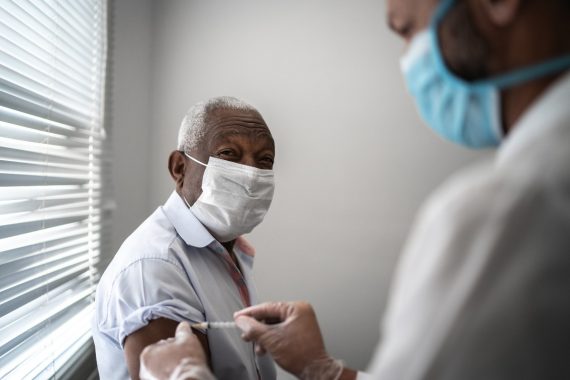A single dose of the Oxford vaccine is as effective as the Pfizer jab in reducing the risk of hospitalisation in those aged over 80, the first real-world analysis of its rollout has shown.
Last week, Public Health England (PHE) unveiled data that showed the Pfizer vaccine reduced hospitalisation and death by over 75% in those who have received one dose.
But a new real-world PHE study has now revealed that a single dose of either Covid vaccine is ‘more than 80% effective at preventing hospitalisation’ in the over-80s, around three to four weeks after the jab, PHE has announced.
Data from the PHE study suggest that both the Pfizer/BioNTech and Oxford/AstraZeneca vaccines are also ‘highly effective’ in reducing infection in those over 70 – with the Oxford jab marginally more effective.
And the real-world data suggests that the Pfizer vaccine also leads to an 85% reduction in deaths from Covid, according to the paper which is yet to be peer-reviewed.
The study, submitted as a pre-print yesterday, compared hospitalisations in confirmed Covid patients aged over 80 who were vaccinated more than 14 days before testing positive with unvaccinated cases.
It also compared vaccination rates in symptomatic over-70s testing positive for Covid with those who test negative, finding that both vaccines are ‘are highly effective’ in reducing Covid infections among the over-70s after one dose, PHE said.
Protection in the over-70s against symptomatic Covid four weeks after the first dose was 57% to 61% with the Pfizer jab and between 60% and 73% with the Oxford vaccine, according to the data.
PHE added that there is evidence that symptomatic infections in the over-70s decreased from around three weeks after the first dose of either vaccine.
The paper concluded that the Pfizer and Oxford vaccines ‘offer similar levels of protection in older adults’.
It said: ‘A single dose of either vaccine provides significant protection against Covid-19 and further protection against severe disease lasting at least six weeks, including against the UK variant of concern.
‘A single dose of [Pfizer] is around 80% effective at preventing hospitalisation and around 85% effective at preventing death with Covid-19. As with [Pfizer], there was additional protection against hospitalisation suggesting vaccine effectiveness against hospitalisation of at least 80% following a single dose of [Oxford].
PHE head of immunisation Dr Mary Ramsay said: ‘This adds to growing evidence showing that the vaccines are working to reduce infections and save lives.
‘While there remains much more data to follow, this is encouraging and we are increasingly confident that vaccines are making a real difference.’
PHE added that second doses providing ‘higher and longer-lasting protection’ have started to be delivered this week to those vaccinated first.
The news comes as a number of European countries had banned use of the Oxford vaccine for patients aged over 65, amid a lack of data on its effectiveness. However, the French Government u-turned on its stance today, amid the growing scientific evidence.
It comes as health secretary Matt Hancock yesterday announced that more than 20 million people across the UK have now had their first Covid jab.
Prime Minister Boris Johnson has announced an ambition for all adults in the UK to have been offered a first dose of a Covid vaccine by the end of July.
Earlier last month, researchers said a new study that showed a single dose of the Pfizer vaccine is 90% effective from 21 days after vaccination supports the UK’s delay of the second dose to 12 weeks.
Official guidance changed on 31 December to say all second vaccine doses should be given after 12 weeks instead of three weeks to maximise the number of people protected against Covid-19 in the shortest possible timeframe.
















